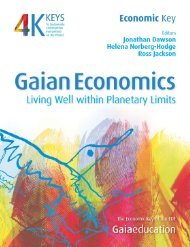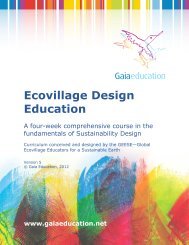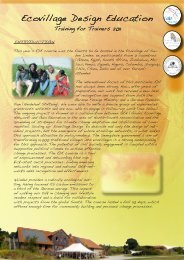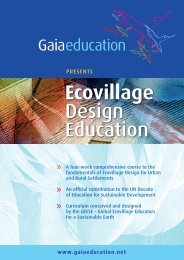Designing Ecological Habitats - Gaia Education
Designing Ecological Habitats - Gaia Education
Designing Ecological Habitats - Gaia Education
You also want an ePaper? Increase the reach of your titles
YUMPU automatically turns print PDFs into web optimized ePapers that Google loves.
agroecology anD ecovillages 259<br />
This precedent was set on our planet<br />
Earth a long time ago.<br />
The more we understand its<br />
‘mystery’, the more we will be able to<br />
surrender ourselves to the emerging<br />
flows always moving through the<br />
system. The more we open our eyes to<br />
these flows, the more we will be able<br />
to see the underlying dysfunctions<br />
in the mechanical production of<br />
agriculture.<br />
Our approach pays special attention<br />
to the evolutionary aspects of<br />
the ecology in productive agroecosystems.<br />
Any mode of agriculture<br />
will have its ecology, by definition,<br />
considering that ecology means<br />
essentially relationship and strategies of interaction. But those interactions<br />
take place on different scales: there are time, space and species-dependent<br />
considerations. As mentioned before, all these interactions are dynamic and<br />
no species can survive apart from a community. ‘Community’ here is<br />
understood as a group of populations interacting, and that is a useful<br />
metaphor for the ‘ecovillage’.<br />
Within an agro-ecological system we, as human beings, are always an<br />
active part of the total ecology, and our presence should be considered<br />
systemically. What this means is that we should be very conscious of the<br />
connections we are creating, judging whether each decision we make is<br />
enhancing or diminishing the long-term health of the system as a whole.<br />
One could ask, “But from an evolutionary perspective, do we really have<br />
that much power? After all, life has been on planet Earth for 3.5 billion<br />
years”. We wish to share the idea that the evolutionary process is taking<br />
place right here and now. From that perspective, each decision we make<br />
becomes vitally important; our persistence in either making or breaking<br />
beneficial connections can certainly influence planetary evolution.<br />
Now, in order to understand how these principles may be applied, we<br />
want to present our experience of promoting resilience in agroecosystems<br />
at Terra UNA, our ecovillage project based in Minas Gerais State, Brasil.<br />
Agroecology<br />
What is agroecology? In this paper we share two definitions: agroecology<br />
can be defined as the study of the interactions between plants, animals,<br />
humans and the environment within agricultural systems. Agroecology can<br />
be seen as a discipline, therefore, which covers integrative studies within<br />
agronomy, ecology, sociology and economics.<br />
We would combine these two definitions into a single conception, where<br />
Having fun with a<br />
heliotrope.







